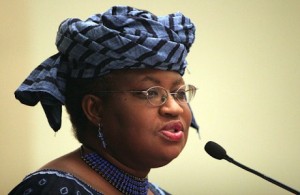Abuja (Reuters) – Nigeria’s finance minister unveiled a tighter budget for 2014 on Thursday but bowed to lawmakers demands and raised the benchmark oil price assumption, which will free up more money for spending ahead of expected elections in 2015.
Normally the president delivers the budget in a speech. A parliamentary source said it was a sign of how rocky relations between President Goodluck Jonathan’s administration and the lower house had become that he chose not to this time.
Thirty seven Nigerian lawmakers defected to Nigeria’s main opposition coalition on Wednesday – part of an ongoing row about Jonathan’s assumed intention to run for another term of office – giving it a slim majority in the lower house.
Finance Minister Ngozi Okonjo-Iweala has faced a delicate balancing act. She has been praised by economists for slashing spending but had to scale back original cutbacks for 2014 following opposition from lawmakers who want to increase spending in the run-up to a presidential election in 2015.
Wrangling over spending cuts had delayed the budget, which was initially supposed to be delivered in November.
The budget was set at 4.64 trillion naira ($29 billion), up from an earlier estimate of 4.5 trillion naira, but still substantially tighter than this year’s 5 trillion naira budget.
Okonjo-Iweala told journalists after leaving the document with parliament that capital expenditure would be 1.1 trillion naira next year, while 2.43 trillion naira will be consumed by the cost of running the government – or about 73 percent of the total, reversing a trend that has seen recurrent expenditure fall as a portion of total spending.
The fiscal deficit will be 1.9 percent of gross domestic product (GDP), slightly above the 1.85 percent recorded this year, the finance minister said.
While Nigeria’s deficit is relatively low, Okonjo-Iweala has maintained a tight fiscal policy, mindful that election cycle spending tends to empty the coffers, leaving the economy vulnerable to oil price or production shocks, and that oil savings are already rapidly running out.
OPTIMISTIC OIL FORECAST
The benchmark oil price assumption, above which oil revenues are deposited into an oil savings account, was raised to $77.5 a barrel, from $74 a barrel in the original budget plan.
The rise means more money spent and less saved than originally intended, but it is in line with what lawmakers were threatening to inflate it to.
Legislators normally prefer a higher benchmark price to free up more money for spending, especially in the run-up to an election.
The ministry later released figures giving a growth forecast of 6.75 percent for Africa’s second-largest economy, in line with the budget plan reviewed by Reuters in September.
Okonjo-Iweala deposited the budget bill in a box in the green and white of Nigeria’s national flag before leaving without saying a word. She later gave the key numbers to journalists outside the assembly.
Nigerian federal government revenue is expected to be 3.73 trillion naira in 2014, the finance minister said, compared with 3.5 trillion in 2013, according to figures in the original budget plan.
This was out of a projected gross federally collectible revenue of 10.88 trillion naira, down slightly from 11.34 trillion naira this year, a figure shared between Nigeria’s three tiers of government: federal, state and local.
Oil and gas revenue was projected at 7.16 trillion naira in 2014. Provision for debt servicing was 712 billion naira, a rise from 591.8 billion naira in 2013.
Okonjo-Iweala projected oil production at 2.3883 million barrels per day, in line with earlier forecasts seen by some analysts as too optimistic, and a 160 naira to the dollar exchange rate.
Lawmakers said they would read the budget over the Christmas period and vote on it next year.
An additional 268 million naira cash rebate from an increase in the subsidised fuel price since January 2012 was set aside for a programme set up to manage that money, the figures showed.
($1 = 159.9 naira)



